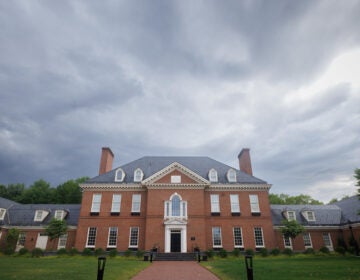Pa. proposal aims to ease government efforts to reclaim records
A bill scheduled for a vote this week would give the Pennsylvania Historical and Museum Commission the power to demand the return of records with historical value.

In this Feb. 5, 2019 file photo, Gov. Tom Wolf delivers his budget address for the 2019-20 fiscal year to a joint session of the Pennsylvania House and Senate in Harrisburg, Pa. (Matt Rourke/AP Photo, File)
State and local government records that have been stolen or have otherwise ended up in private hands without authorization would be much easier to reclaim under legislation that could pass the Pennsylvania House in the coming days.
A bill scheduled for a vote this week would give the Pennsylvania Historical and Museum Commission the power to demand the return of records with historical value and to ask Commonwealth Court to order that they be turned over.
“A lot of records, they appear on eBay,” said commission spokesman Howard Pollman. “And we have no legal recourse to say, ‘Hey don’t sell that, that’s ours.'”
Local governments that believe their records are improperly in the hands of others would also be empowered to ask for the records or request that the commission use the same process to procure their return.
The commission says it has had some success at persuading people who own government historical records to return them, but the agency has also undergone some costly or futile efforts.
Recovering records
A university library in another state flatly rejected a request for an 18th century register of Dauphin County slaves, Pollman said.
Officials pursued Lycoming County and state-related records from a vast collection up for sale by an estate in 2000, but were offered a price that was deemed too high. The documents were sold off to buyers around the country instead.
The commission ended up spending $5,000 to purchase a 1850s-era convict affidavit book from long-closed Eastern State Penitentiary through a manuscript dealer.
The commission also paid $1,000 to recover five pages from a 1777 military document that had apparently been stolen from its collection.
Unloading surplus
The legislation, and a nearly identical bill pending in the Senate, would also simplify the process for selling or giving away excess property in the commission’s hands. It would remove a statutory provision that requires the commission to contact the original donors when selling or giving away items.
Pollman said the commission still plans to contact donors, but the change will simplify the disposal of what is deemed abandoned property.
“We’re going to reach out to them as much as we can,” Pollman said. “It just makes it easier for us.”
Items on loan to the commission for at least 21 years can be considered abandoned if the original lender can’t be found.
A comprehensive inventory of the state’s millions of historical items — and tens of millions of documents — has been going on for several years. Pollman said that’s one reason the commission is seeking ways to make it easier to unload surplus items.
Residential leases
Historical properties that are rented out, such as caretaker homes on parkland, could be leased for up to 25 years under the two bills, compared to five years in current law.
Pollman said the goal is to give potential renters more of an incentive to pay for and perform improvements in instances where properties require renovation or restoration.
“A lot of that is providing us with an opportunity to explore more creative ways to preserve our historic structures,” Pollman said.
Unsealing after 75 years
The legislation has a provision that would make documents public after 75 years, unless some other state law prohibits release.
Legislative process
Similar legislation failed to get out of the General Assembly during the session that ended in December.
“Preservation of historical items, properties such as buildings, landscapes and other components of historical significance is essential,” said a sponsor of the Senate bill, Sen. Mario Scavello, R-Monroe. “Pennsylvania has a rich and vibrant history and we must do all we can to ensure that our heritage is preserved for future generations.”
The House bill would be sent to the Senate if it gets a positive vote.
WHYY is your source for fact-based, in-depth journalism and information. As a nonprofit organization, we rely on financial support from readers like you. Please give today.




